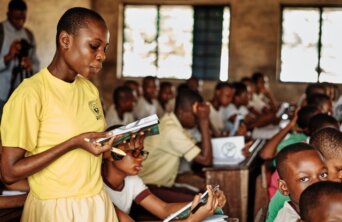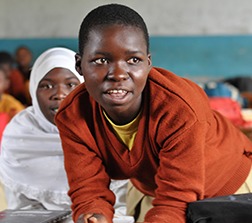- About
- Topics
- Picks
- Audio
- Story
- In-Depth
- Opinion
- News
- Donate
- Signup for our newsletterOur Editors' Best Picks.Send
Read, Debate: Engage.
| topic: | Women's rights |
|---|---|
| located: | Sierra Leone |
| editor: | Bob Koigi |
Twenty years ago, the Maputo Protocol on Women's Rights came into effect to protect the rights of girls and women, promoting gender equality and removing gender-based discrimination.
The 2003 Protocol remains one of the most progressive women's rights treaties globally and has been pivotal in the journey to equality in Africa. The rights enshrined within it include the right to health, education, economic and social welfare, protection before the law, inheritance and elimination of harmful practices.
Of the 54 African nations, 44 have signed and ratified the treaty. Its provisions have had far-reaching legal implications for signatories' domestic laws.
Regulations that set the minimum age of marriage for boys and girls at 18 are now in place in 43 countries, and 22 out of 29 African countries that once practised female genital mutilation (FGM) have banned the process.
Countries have also broadened their legislative space to allow access to safe abortion in instances of rape, incest, sexual assault or when the pregnancy endangers women's mental and physical health.
Some landmark rulings have cited the treaty; for example, in 2020, a court in Kenya ruled that the government had violated human rights instruments (among them the Maputo Protocol) after it failed to prosecute cases of gender-based and sexual violence at the height of the 2007 post-election violence.
The court ordered the Kenyan government to pay each of the four survivors approximately $40,000 in compensation.
In a 2019 ruling, The Economic Community of West African States (ECOWAS) Court of Justice ruled that Sierra Leone's government violated Articles 2 and 12 of the Maputo Protocol - the right to education - when it banned pregnant girls from school. The ban is no longer in force.
But even as the continent and the world celebrate the milestones achieved through the treaty, there are still challenges, especially in embracing the protocol.
Botswana, Egypt and Morocco have not yet signed the treaty, which is only the first step.
After a treaty is signed, it must be ratified by the country's parliament to be officially approved.
Eight countries have signed but not ratified. These are Burundi, Central African Republic, Chad, Eritrea, Madagascar, Niger, Somalia and Sudan.
And 24 signatories have not fulfilled their reporting obligation to the African Commission on Human and Peoples' Rights.
This has created room for discriminatory laws. Customary and civil laws have also, to some extent, fanned violations of women's rights, especially in countries that have not yet ratified.
Extra advocacy work is required to give teeth to the treaty and for the remaining countries to put pen to paper. Players working to promote women's rights must speak in one voice to ensure more straightforward implementation and protection of these rights at all times.
Image by Emmanuel Ikwuegbu.

